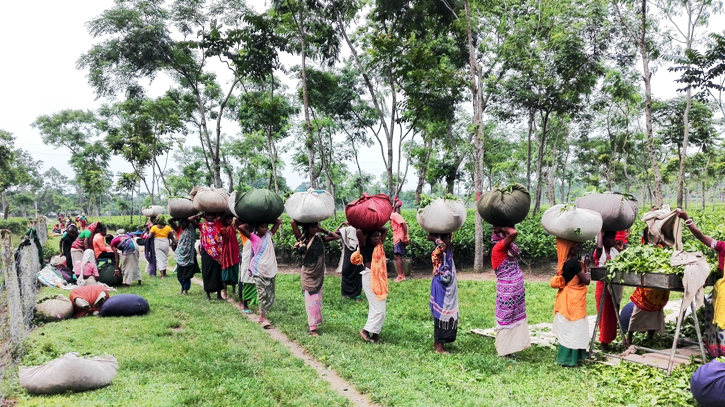
Women tea plantation laborers in Sreemangal are waiting for their hand-picked tea leaves to be weighed in a tea garden. The photo was taken recently. Photo: Messenger
The favorable temperature, sufficient rainfall, favorable weather, and the vigilance of the Tea Board have led to a bright possibility of achieving record tea production in the country during the current tea harvesting season.
According to the Bangladesh Tea Research Institute located in Sreemangal, about 2,000 millimeters of rainfall is needed per year for tea cultivation. In the months of June, July, August, and September of the tea harvesting season, there has been sufficient rainfall, which has resulted in extensive benefits for tea production.
Anisur Rahman, a meteorologist at the Sreemangal Weather Observatory, reported that from January to October, Sreemangal experienced a remarkable 2,930 millimeters of rainfall, ideally suited for tea cultivation. The data indicates that the region enjoyed substantial precipitation, making up for a dry January.
Subsequent months brought good news, with 113 millimeters in February, 99 millimeters in March, 186 millimeters in April, and a whopping 695 millimeters in May. The monsoon season kicked in with 307 millimeters in June, followed by 375 millimeters in July, 251 millimeters in August, and 66 millimeters in October.
It is understood from sources that this ample rainfall during the current season will lead to the rapid growth of tea bushes. The quantity of plucking (leaf picking) will increase, and the tea bushes will remain robust. Increased plucking of tea leaves will also lead to higher tea production.
According to the Tea Board, the target for tea production in the country during the current tea harvesting season has been set at 102 million kilograms, which is equivalent to 10 crore 20 lakh kilograms. Until the end of September next year, Bangladesh has produced a record 69.084 million kilograms of tea in the Sreemangal tea industry. In the same period last year, the country produced 63.833 million kilograms of tea.
It is estimated that during the current season, the target for tea production will be surpassed, setting a new record in the history of the tea industry in Bangladesh. The Tea Board reports that in 2021, the country produced a record-breaking 96.51 million kilograms of tea, surpassing all previous records in the tea industry. Tea scientists suggest that this year, Bangladesh is poised to set a new record of 102 million kilograms of tea production, surpassing all previous records.
To further bolster the tea industry's development, the Bangladesh Tea Board has devised a comprehensive plan known as "Path to Development: Bangladesh Tea Industry." Under this strategic initiative, the government is dedicated to elevating tea production to an even more ambitious target of 140 million kilograms by the year 2025.
This commitment to growth and innovation ensures that the future of tea production in Bangladesh remains bright, promising not only to meet but also to exceed the world's expectations in the world of tea.
Messenger/Kajal/Sun Yath








